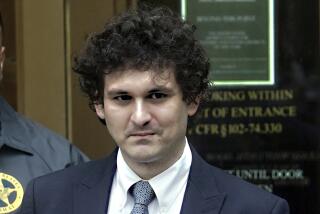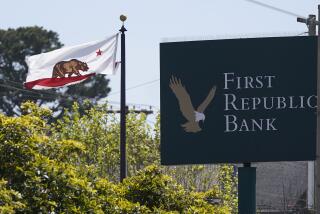Bernanke the enforcer
- Share via
Federal Reserve Chairman Ben S. Bernanke called Tuesday for a new, “holistic” approach to regulating the financial industry, including a mix of tougher and more flexible measures to avert another global meltdown. But as Congress works to improve safeguards for depositors, investors and taxpayers, it needs to bear in mind something that happened in a Manhattan courtroom later in the day: Former Nasdaq Chairman Bernard L. Madoff signaled that he would plead guilty to operating one of the costliest securities frauds in history. As Madoff’s example illustrates, even the best regulations won’t do a bit of good if they’re not rigorously enforced.
Bernanke’s speech to the Council on Foreign Relations addressed several of the weaknesses in today’s regulatory system. The biggest is the lack of accountability for the overall health and stability of financial markets. Each regulatory body has its own turf and rules, an approach that invites firms to take advantage of the gaps in oversight. That’s not necessarily a bad thing -- companies and investors should have the freedom to take substantial risks with the money they raise privately. The problem is when, in situations like the subprime mortgage fiasco, private risk-taking leads to significant public consequences.
The Fed chairman rightly urged Congress to give a single regulator the responsibility to monitor the financial industry for “systemic risk.” In particular, he said some governmental agency should have the power to intervene when necessary to curtail practices that threaten the banking system, investors or the credit markets. He didn’t say so specifically, but he clearly was talking about enabling the government to respond to the kind of irrationality that inflated the housing bubble. When brokers, lenders, rating agencies, investors and insurers all act as if every bet is a sure winner, someone needs to be able to quiet the mania and insist on more diligence, more transparency and higher capital reserves.
Bernanke also was right to call for increased oversight of firms that grow so large and enmeshed with other firms that they would cause widespread damage to the economy if they failed. Although we’ve endorsed the government’s moves to recapitalize major banks and keep credit flowing, we’ve argued that the notion of institutions “too big to fail” skews the incentives of financial firms in dangerous ways. Those that grow large enough to merit a rescue should be subject to closer scrutiny to ensure that they’re monitoring and accurately reporting how risky their holdings are, as well as girding adequately for a downturn.
Yet there was one important piece missing from Bernanke’s proposal. One of the main lessons of the Madoff case is the need for a common set of rules based on what firms do in the financial markets, rather than what kind of firms they are. Unlike other companies that handled sizable investments, Madoff’s wasn’t required to trade securities through a third party. Instead, his firm did them itself, enabling him to conceal his scheme for years. Nor was he required to make the kind of disclosures that would have led investors to detect the fraud. Of course, it didn’t help that the Securities and Exchange Commission ignored repeated warnings about Madoff. But that’s reason enough to have a more uniform approach to regulation that emphasizes transparency, making investors less dependent on the competence of the feds.
More to Read
A cure for the common opinion
Get thought-provoking perspectives with our weekly newsletter.
You may occasionally receive promotional content from the Los Angeles Times.









